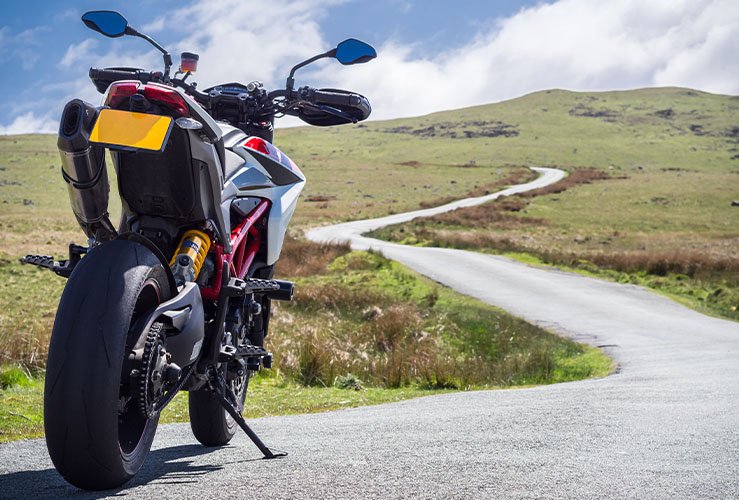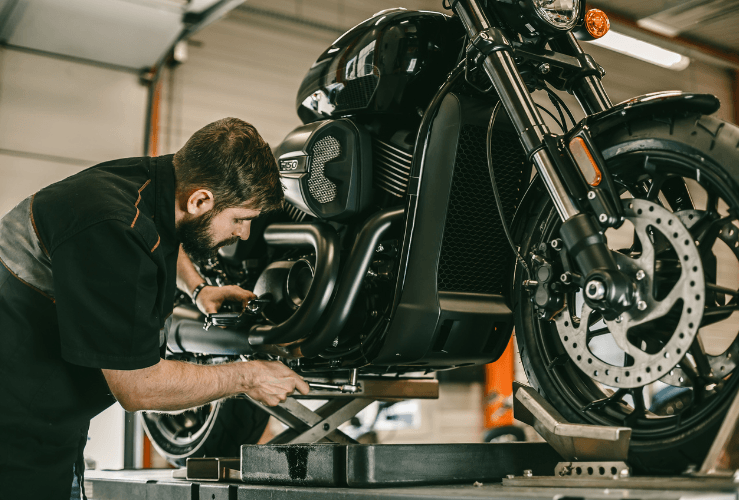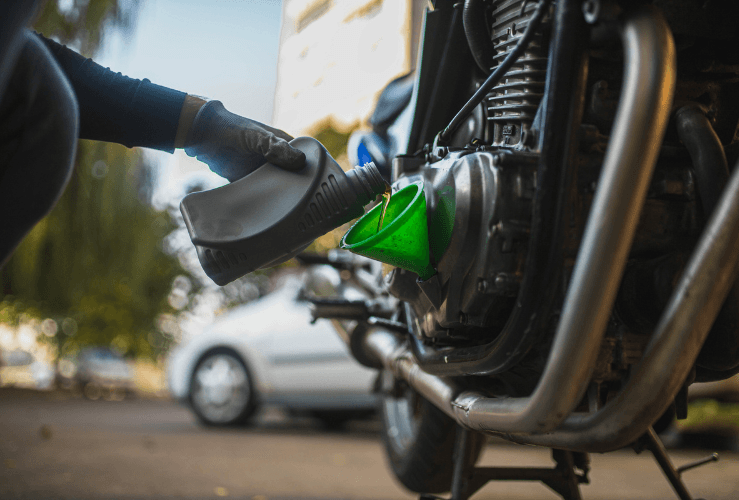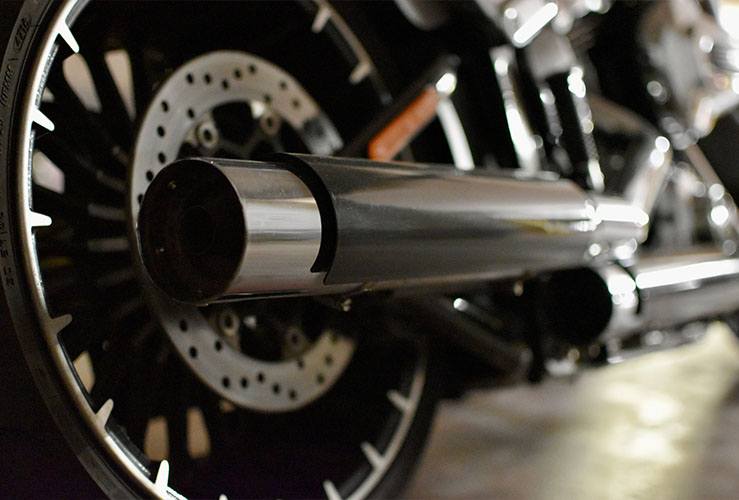As the owner of a motorcycle, it is your legal duty to ensure it is roadworthy and does not pose a hazard to yourself, any passengers, other road users or the general public.
After ensuring your motorcycle is fully serviced, make sure you're protected with reliable breakdown cover. Explore our motorcycle breakdown cover options, for peace of mind on the road.
Why are motorcycle services important?
A full motorcycle service will ensure any mechanical or electrical problems are ironed out ahead of your MOT and of course before they affect the safe operation of your motorbike.
Regularly servicing your motorcycle will not only prolong its life; Your machine may also be more efficient and more pleasant to ride when all its components are in optimum condition.
Should you decided to sell your motorcycle at any point, having a full service history which demonstrates that you have maintained your bike, can help to improve the resale value over a less well maintained bike.

Motorcycle servicing: What are the different options?
There are various service options available when it comes to motorcycle servicing.
You can opt for a full motorbike service, an interim service, and in some cases, a major motorbike service.
Read on to find out about what each motorbike service option includes.
What does a full motorcycle service include?
What constitutes a full service when it comes to motorcycle servicing can vary a little from garage to garage, but in general a full motorcycle service should pinpoint and address any issues that may affect the safe operation of your machine.
The motorcycle full service checklist should incorporate:
Engine checks
- Oil change – the grade used will depend on the manufacturer’s recommendation
- New oil filter
- New air filter
- New spark plugs
- Test/replace/top-up coolant as required
Chassis & brake checks
- Brake callipers removed and cleaned
- Brake pistons degreased
- Hydraulic Brake Fluid System inspected and topped up as required
- Control cables, levers and pivots (throttle, clutch, brakes) cleaned and lubricated
- Adjustment of throttle and clutch
- Battery electrolyte level checked and topped up as required
- Steering play and race bearing kit – examined for any looseness and adjusted as necessary
- Front fork – inspected and checked for operation
- Rear suspension – inspected and checked for operation
- All fasteners – including engine mounting and chassis bolts – inspected and tightened as required
- Wheel bearings – checked
- Main and side stands checked and lubricated
- Headlight checked for aim and focus - adjusted as required
- Fuel hosed checked
- Tyre pressures – checked and adjusted as necessary
- Chain – adjusted and lubricated as necessary
- General lubrication
Road test
With motorcycle servicing, a full service will include a road test to ensure the motorbike is running as expected.

Full service vs interim service: What's the difference?
Garages also offer ‘interim checks’, which go into less detail than motorbike full services, but still ensure the vital components of your motorbike are working as they should be.
As the name suggests, an interim motorbike service should keep your bike in good condition between full services.
The interim motorbike service will very likely include an oil and oil filter change, as well as checks to key bike parts including:
- Brake callipers
- Pistons
- Cables
- Levers
- Pivots
- Wheel bearings
- Headlights
- Chain function
- Tyre pressure
An interim service should also include a road test.
Does a full motorbike service include the changing of brake fluid?
Whilst a full service will check brake fluid levels, and top them up if required, most full services won’t include a brake fluid change. For a brake fluid change to be included as part of your service, you would normally require your motorbike to be booked in for a major service.
How often should brake fluid be changed on a motorcycle?
When you need to change your motorbike's brake fluid can vary depending on the manufacturer's recommendations and the type of brake fluid used. You will find details of the recommended intervals in your bike manual
As a general rule of thumb, your motorcycle brake fluid should be changed every 8,000 miles or at least every two years.
If you experience the sensation of a spongy brake lever or an inconsistent brake feel, where the brakes may feel soft at times and firm at others, these could be signs that your motorbike brake fluid needs changing.
Why is it important to change brake fluid on my motorbike?
Brake fluid creates a form of pressure between the brake lever and the brake pads, which stop the bike.
Brake fluid is hygroscopic and absorbs moisture. This means that, over time, the quality of brake fluid deteriorates as a result of this moisture absorption.
If your brake fluid is contaminated or gets too low, it can affect your control of your bike. Without this fluid your bike would not be able to stop when you brake.
What is a major motorbike service?
Some garages may offer a ‘major service’, which is a full service plus a very detailed inspection and servicing of your motorbike’s components. For example, a major motorbike service might include removing and cleaning brake callipers and flushing the hydraulic system.
Such a comprehensive service will pick up any potential problems early on - making future MOTs a breeze, and helping to make your ride safer.
To establish the motorbike services that your chosen garage offers, contact them for details of their motorcycle service price list.

How much is a motorbike service? - How much is a full service for a motorbike?
The cost of a full motorbike service depends on the size of your engine and the specific pricing of your chosen garage.
Motorcycle servicing costs at an independent garage may be less than motorcycle services costs at a garage which is part of a nationwide or regional chain, because the latter has larger operating costs for things like marketing and city centre business rates. And unlike some small garages, chains will need to pay VAT.
Here is a rough idea of what you might expect to pay for a motorbike service:
- Below 250cc: £80 - £130
- 250cc – 600cc: £90 - £160
- Up to 1000cc: around £180
Motorbike repair costs
If the service highlights that you need any motorbike repair work carried out, which is not included in the service plan, the motorbike repair costs will be in addition to the motorbike service charge.
How often should you service your motorbike?
When it comes to motorbike servicing, a mechanic should be looking at your motorcycle every six months or so - which equates to every 2,500-4000 miles.
Defects on a motorcycle have the potential to be extremely dangerous, so keeping to a regular maintenance schedule for your bike is paramount.
How long does it take to service a bike?
A motorbike service can take anywhere between 45 minutes to a day, depending on the issues discovered during the service.
Generally, you would be looking at an average of around 2 hours for a motorbike service.
Remember to factor in that the point at which the garage will start work on your motorbike will depend on how many other jobs that they have booked in for that day. It’s best to find out when the garage thinks that your motorbike may be ready by.

Can I service my own motorbike?
Whilst it is advisable to instruct a professional to undertake a full service of your motorbike, there are some basic motorbike maintenance tasks that you can complete yourself.
These might include:
- topping up or changing the motorbike oil
- checking and changing the battery on your motorbike
- greasing your bike
- ensuring your chain is tightened.
Note: You should always check your vehicle handbook for any fault remedy before carrying out any work on your vehicle. If you are unsure of what is required to fix any problems, please consult a professional.
How do I find out about motorcycle servicing availability near me?
The quickest and simplest way to find motorcycle servicing providers and where to service your motorbike is to search on the internet.
There are also numerous motorbike website forums where it may be possible to seek recommendations for a garage offering motorcycle servicing near you.

MOTs: What are common defects?
Lights and reflectors: During an MOT nearly two in five defects - and half of all major defects - relate to lamps and reflectors. Your lamps will need to be in good working order, securely fitted, the right colour, and angled in the correct direction.
Steering and suspension: Problems with steering and suspension are also common: this encompasses forks, handlebars, grips, mountings, head bearings, swinging arm, shock absorbers, and damping effect.
Tyres and wheels: Around a tenth of defects relate to tyres, while only 1% concern wheels. Any issue with a tyre is very serious, and historically in MOT scenarios 37% of tyre issues are deemed ‘dangerous’. Tyres must be securely fitted and of the correct type, while tread depth must be 1mm+ on motorbikes over 50cc. The condition of the valves and the wheel bearings must also be satisfactory.
Braking: Brake issues account for just under one in five MOT defects, with around a third of these classed as “dangerous”. Brake hoses, disc brakes, pads shoes and ABS warning lights (if present) must all be in good working order.
Components that fail less often (but are still critical)
- Exhaust system
- Fuel system
- Seats
- Wheel Alignment
- Sidecars (if present)
- Horn
- Plates

How much is a motorcycle MOT?
The maximum price of an MOT for any motorcycle is set at £29.65.
For bikes with a sidecar, expect to pay up to £37.80 for an MOT.
Which is more thorough, an MOT or a full motorbike service?
An MOT does not cover the engine, clutch or gearbox, so a full motorbike service is the most thorough series of checks your machine can undergo.
Motorbike servicing discounts
We have teamed up with Halfords Autocentres to bring our customers 10% off services.
This offer can be applied to interim services, full services or major services.
Breakdown cover for motorbikes
Although regularly servicing your motorcycle will prolong its life it is inevitable that some motorcycles will suffer a breakdown at some point. Breakdown cover for your motorcycle gives you peace of mind, should the unfortunate happen.
Download our pdf checklist: Full motorcycle service checklist
For more advice on how to keep your motorcycle in the best possible condition, we have compiled a motorcycle maintenance checklist of 10 motorcycle checks you can do yourself.




